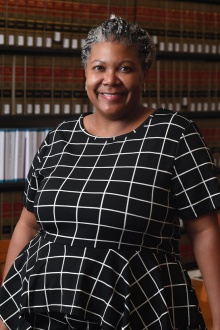
Broad experience, intense focus
Pamela Newell, Lecturer in Legal Analysis, Writing and Research
With four academic degrees and aspirations toward another, Pamela Newell knows the value of rigorous study in higher learning.
But her broad real-world experience—she has been in private practice, taught at the university and community college levels, worked as an appellate court clerk and investigated EEO complaints—enables her to bring to the classroom plenty of practical wisdom in how the law is applied.
Newell joined the faculty this fall as a lecturer in the LAWR (Legal Analysis, Writing and Research) program, where she will shepherd about two dozen first-year UB School of Law students in the essential skills of the profession. She arrived from the University of North Georgia at Dahlonega, where she taught Criminal Law, Criminal Procedure, Evidence, Juvenile Justice and Introduction to Criminal Justice and also served as the university’s ombudsman.
Newell has been steeped in legal writing and research since she served as a research assistant for one of her professors at the University of North Carolina at Chapel Hill School of Law, where she earned her J.D. It’s a skill that she further honed after law school with a clerkship in the North Carolina Supreme Court and then in that state’s Court of Appeals.
Having been at both ends of the classroom, Newell realizes that her students are in essence learning a new language. As an undergraduate English major, she says, “I did a lot of research and writing, but it was not the same type of research and not the same type of writing. For one thing, you’re using completely different publications and a different citation method. It was actually really refreshing—I enjoyed learning at law school—but it was very different from my undergraduate experience.”
She’s sensitive to the learning curve and what her first-year students are going through. “I want them to be relaxed in my class,” Newell says, “and I want this to be their favorite class when they come to school. I don’t try to terrorize them or do any type of boot camp. I don’t think you need to be all that tough to be a successful lawyer, but you do need to be a great writer.”
Newell has continued to pursue her own academic interests, earning a master of laws degree from American University Washington College of Law and, just last year, a master’s degree in forensic psychology from Arizona State University. Her new diploma complements her interest in criminal justice, her most recent teaching area.
“A large part of criminal justice is forensic psychology,” she says. “Why do offenders offend? Why are there repeat offenders? How much does your mentality have to do with who becomes a criminal and who doesn’t, and how much is due to your environment and upbringing? It’s just a fascinating subject to me.”
She’s looking ahead towards earning her doctorate in law, and in the meantime to pursuing scholarly research in criminal justice topics, including reform of the criminal justice system, juvenile justice, appellate advocacy and capital punishment.
And she continues to expand her own writing repertoire, celebrating the pending release of Understanding Criminal Procedure (Great River Learning), her digital textbook designed for college students majoring in criminal justice.
She knows from experience that there’s no more effective way to learn than by practice. “The only way to get better at writing,” she says, “is to write.”